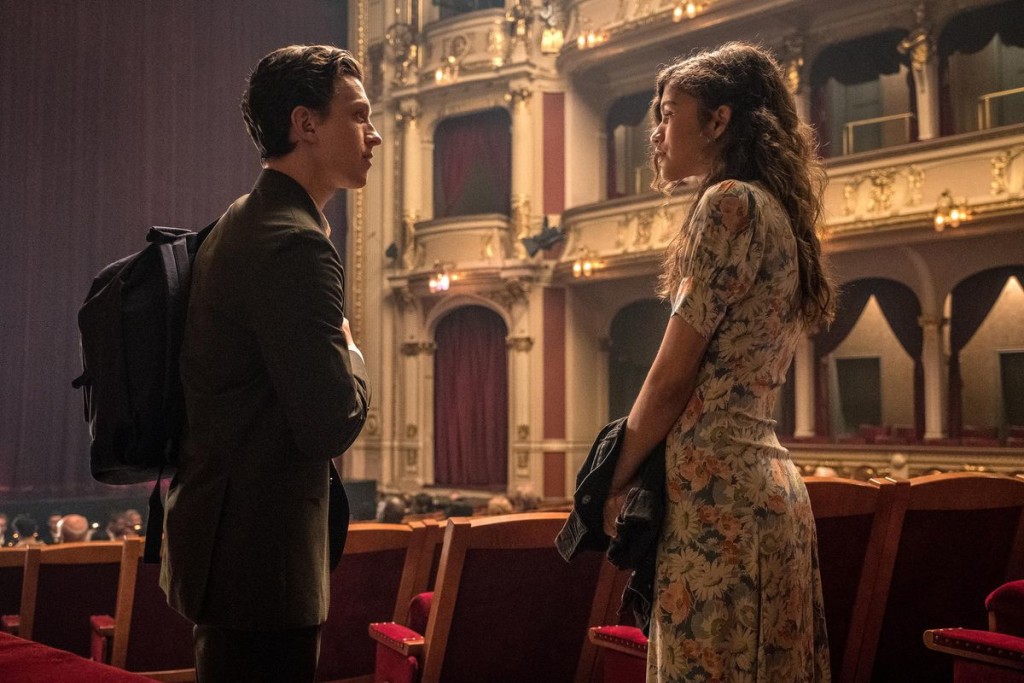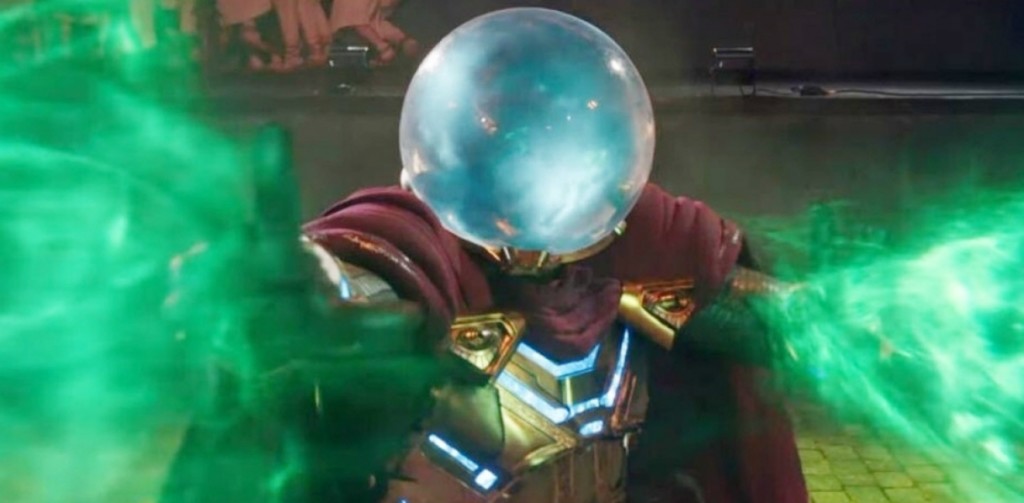Genre: Superhero
Premise: Peter Parker goes on a European vacation with his high school class, only to run into a cool new superhero from another dimension who isn’t everything that he seems.
About: Spider-Man Far From Home has pulled in 185 million dollars since it opened on July 2nd, which I’m sure, the marketing minds at Marvel will tell us, is a record-breaking opening somehow. This marks the end of Marvel’s “Phase Three.” Little is known about Phase Four. So far we’re getting a Black Widow movie even though she just died, The Eternals, Black Panther 2, Doctor Strange 2, Guardians of the Galaxy 3, and Captain Marvel 2. Many speculate that Phase 4 includes the “Skrulls,” an alien species that are slowly and methodically taking over earth.
Writers: Chris McKenna and Erik Sommers (based on the comic book by Stan Lee and Steve Ditko)
Details: 2 hours 9 minutes
I have good news for screenwriters.
This is the first time I watched a Marvel movie and thought, “There isn’t a whole lot more water left in this well.” Far From Home wasn’t a bad movie. It even contained some original elements, which is getting increasingly hard to do in this genre. But I couldn’t help but notice, “I’ve seen this all before.” If that’s true, it opens up the opportunity for original ideas to shine again. And if you’re a screenwriter, that should be music to your ears.
In Spider-Man’s defense, he was put in a tough position. This movie is the house party the night after Burning Man. No matter how many kegs you have. No matter how many people show up. Everyone’s still only giving you 50%, because they gave everything to the night before. Never have the stakes felt as low in a Marvel movie as they did in Far From Home.
For those who haven’t seen the film, Peter Parker and his school class go on a trip to Europe. Since Peter is emotionally drained from saving the world and losing his de facto father, Tony Stark, he doesn’t want anything to do with Spider-Man right now, so he leaves his spidey suit behind.
Once in Venice, Italy, however, a giant water monster thing shows up and starts beating up buildings. Out of nowhere, a flying man with a fishbowl on his head battles the monster, and with Peter’s help (who fights without his costume), defeats it. Nick Fury arrives and introduces Peter to this new superhero, Mysterio, who is from a parallel earth. Mysterio says more of these monsters are coming.
Meanwhile, Peter receives a late gift from Tony Stark – his glasses! Which have a built-in OS that controls all of Stark Industries, including his weapons arsenal! Determined to remain a high school kid, Peter gives the glasses to his new best friend, Mysterio, and goes on his merry way. Once Peter’s gone, everything around Mysterio begins changing. We realize that Mysterio has been using illusions all along to trick Peter into gifting him Stark’s glasses. Now, with the power of Stark Industries behind him, Mysterio can take over the world!
Far From Home has a lot of good but also a lot of bad.
Let’s start with Mysterio. I loved this character because he calls out exactly what we’re all thinking. “Elementals?! From a parallel earth? I can’t believe any of that worked!” Mysterio is playing into the absurdity of comic book movies these days. That meta approach immediately won me over. Cause as I was watching him, I didn’t even understand his powers. He shoots green rays? What does his fishbowl head accomplish exactly?? Once we realize Mysterio feels the same way we do, it’s fun.
Far From Home also uses a powerful tool in the screenwriter’s arsenal: THE INTERRUPTION. When you’re coming up with your plot, a simple way to look at it is that you have your hero going about their life… AND THEN SOMETHING COMES ALONG AND INTERRUPTS IT. The bigger the interruption, the better. The only thing Peter wants right now is MJ. That’s his goal on this euro-trip. That gets interrupted by Mysterio.
But don’t limit your interruptions to the overarching plot. You can use interruptions anywhere! In fact, whenever things are moving along too easily, too smoothly, you should be throwing an interruption into the mix. Interruptions are a key component to making your movie feel like real life. Because when does life ever go according to plan?
Another thing Far From Home does well is inject several original set pieces into the mix. Remember what we always say. Come up with an idea that allows you to do things audiences haven’t seen before. Especially if you’re writing a big budget movie, where set pieces are the primary currency. The character of Mysterio allows the writer to throw in a bunch of scenes where we don’t know what’s real and what isn’t. Reality fades and Nick Fury becomes Mysterio. An office building becomes an empty construction site. Giant freaky images give way to gianter freakier images and, pretty soon, Peter doesn’t know which way is up. Those were scenes we hadn’t seen before in Marvel movies.
Now on to the bad.
The “blip” may be the dumbest plot choice a franchise has ever implemented. I’m talking worse than midi-cholorians. In Avengers Endgame, the superheroes go back in time to reverse Thanos’s infamous snap, bringing back all the people who disappeared (of which Peter was one). Except while everyone who comes back is the same age, everyone who remained is five years older.
Why is this relevant to this movie? Because now you have this bizarre scenario where people who were in 6th and 7th grade are now older than the people who disappeared. Peter and his friends (who all conveniently disappeared, like him) are now younger than the people they were older than. It’s so unnecessarily bizarre and weird and doesn’t make any sense at all, that I wanted to walk out of the film right then and there. Marvel made a deal with the devil. They wanted this ‘go back in time’ plot, and they screwed up the entire logic of their franchise to get it. (By the way, if you’re wondering why Peter Parker got snapped in Infinity War, it wasn’t some brave creative choice. They had no choice but to do it because if Peter wasn’t snapped, he would now be 21 and look totally different and not be in high school anymore).
I’ll give it to McKenna, though. He did the best he could. Remember when you’re writing at this level, you’re rarely coming up with the plot yourself. The plot is being handed to you and along with it, a set of problems. That’s what you’re being paid for – to problem solve, and to do it quickly. For example, they’ll say, “We need a scene that conveys the blip in an easy-to-understand way.” So McKenna comes up with an opening school news segment where two high school anchors humorously explain how the blip happened. It’s not perfect. Everyone who works in Hollywood groans at the scene. But as long as it works for the masses, that’s fine. And McKenna makes the scene funny enough that we’re not focused on scrutinizing the stupidity of it.
For the next issue, I don’t know who to blame. It could be the producers, it could be Feige, it could be the director, who knows. But one of the worst things you can do in a script is sacrifice character consistency for a joke or a scene or a plot point. In the movie’s worst sequence, the class is being bussed from Venice to Prague, and as Peter talks to Tony’s AI glasses, he inadvertently orders them to kill one of the other students. We cut to Stark’s super-satellite in space, where a killer drone emerges, flies down to the bus, forcing Peter, who all of a sudden morphs into Jar Jar Parker, to dismantle it before it kills the kid, all while keeping his identity a secret. The sequence makes Peter Parker look like the dumbest person on the planet. The faultiness of the software – that it would make such a mistake in the first place – is inconsistent with everything about Tony Stark. Not to mention, nothing about the sequence rings true.
It’s only when you take a macroscopic look at the scene that you realize why it’s in the movie. The story needed to set up the danger of these glasses – what they had access to – for us to understand what Mysterio had gotten his hands on, as well as set up the satellite’s use for later in the film. This was McKenna’s not so ingenious idea for doing so. Even before the scene happened, I was asking myself, “Why are they driving to Prague instead of flying?” It made absolutely no sense. Afterwards, however, it was clear: It would be easier to create a “Peter saves the other student from the Stark Satellite” moment on a bus than it would on a plane.
And look, I get it. Sometimes producers want scenes written in 24 hours and you do the best you can do. Still, it was moments like this that kept Far From Home from being anything other than an average Marvel movie. I’m not even sure I liked it as much as Captain Marvel. And that was the most generic Marvel movie of them all.
I don’t know if I’d ever be able to give a movie with both Tom Holland and Jake Gylenhaal a bad grade. In my happy place, the three of us are best friends and play video games all day and order In and Out from Postmates at six hour intervals. So I’m recommending this mainly on their charisma and star power alone. But if upcoming Marvel movies begin to trend in this direction, they may point back to this film and say, “That’s where it all started.”
[ ] What the hell did I just watch?
[ ] wasn’t for me
[x] worth the price of admission
[ ] impressive
[ ] genius
What I learned: “The Power of the Interruption” – I have a scene-writing challenge for you. Two characters. Have them doing something fun. They’re in a good mood. And then INTERRUPT them with something not good. This is one of the easiest ways not just to start a movie, but to write a good scene.
Genre: Action/Drama
Premise: When a terrorist group takes hundreds of hostages captive in the Empire State Building, a fearless CIA agent sneaks into the famous landmark and climbs 66 stories to take down the bad guys.
About: Today we get a script from S. Craig Zahler, who STILL holds the #3 spot on my Top 25 List (look over to the right side to see the Top 25). Zahler’s recent foray into directing has finally gotten him enough clout to get Brigands of Rattleborge made. Park Chan-wook, the director of one of the best movies ever, “Oldboy,” will steer the Western. Matthew McConaghey is almost a go to star. A little known fact about Zahler. He’s a metal head and scores his own films!
Writer: S. Craig Zahler
Details: 121 pages
Zahler is at an interesting point in his career. For an entire decade, he was one of the most successful unproduced screenwriters in the business. Maybe even THE most successful. He sold a ton of scripts. But his heavy-handed novelistic voice was both an ally and an adversary. It helped him stand out from the pack. But people weren’t sure his scripts would translate to the big screen.
At some point, Zahler had enough. If you’re not going to make my movies, he said, I’ll make my movies. And he made Bone Tomahawk. Then Brawl in Cell Block 99. And most recently, Dragged Across Concrete. Perhaps his ten years in waiting was a predication of what was to come after all. His movies have been received fairly well from critics. Hard core cinephiles also enjoy them. But the jury’s still out on if there’s a mainstream audience. This is one of his most commercial scripts. So maybe it changes the conversation.
Rhett Westermark feels guilty every day for not being there when his older brother died. The two were firefighters when 9/11 went down. While he eagerly waited to be called in, he heard over the radio that the building his brother was in collapsed. Twelve years later, Rhett, now a CIA agent, finds it tough to open up to anyone. He’s so detached from his relationship with his girlfriend, Danielle, in fact, he tells her she can go out with other men while they’re together.
New York City is already on heightened alert when terrorists take over the Empire State Building. The president is in town, deflecting heavy criticism for America’s participation in the Breznian war. The terrorists secure floors 66 and 67, huddling up 500 hostages, then announcing their demands. The government is to deliver them the president of the United States by 5pm or they will start throwing one hostage out of the building every half hour.
The city calls their bluff and, sure enough, they toss someone out with a noose around their neck. When the rope goes taut, the hostage’s head snaps off. These guys are nothing if not dramatic. The city then sends in a SWAT team. But the terrorists easily take care of them. They subsequently announce a punishment for the SWAT team. Now TWO people will be thrown off the building every half hour.
Westermark tells his coworkers that there’s no conventional way to handle this situation. He has an idea. He’ll go in, all by himself, then use an elevator shaft to pull a bin full of weapons to the 66th floor. He’ll then arm the hostages and make it a fair fight. Before they can agree with Westermark, he’s off. He’s not going to wait around for people to die this time.
But people do die. As Westermark painstakingly moves up the Empire State Building one floor at a time, he keeps encountering terrorists. And when these terrorists report up to their boss, more hostages are tossed off the building. But Westermark eventually gets to the hostage floor and meticulously arms the hostages one by one through bathroom breaks. Finally the signal comes in and it’s an all out war between captives and captors!
One of best ways to find a big idea, something that’s going to attract producers, is to take a famous movie and find a fresh way into the idea. Here, Zahler has basically created a fresh take on Die Hard – which is: what if we did the serious/realistic version of Die Hard?
The problem with looking for fresh takes on popular ideas is that there’s still no guarantee that the idea will be interesting to people. In other words, just because you have a new take doesn’t mean it’s going to be a good take. Is a serious version of Die Hard something people want to see? I don’t know, to be honest. I’m lukewarm on the concept. But that doesn’t mean others won’t be into it.
The strange thing about “Breaking” is that it spends a lot of time setting up its characters and yet I didn’t feel like I knew any of them. Westermark, in particular, was relegated to “guy who lost his brother in 9/11.” There wasn’t anything deeper than that. And since the 9/11 survivor thing is used so often in storytelling, you need to bring more context to it in order to overcome the cliche.
A big issue was that Westermark never spoke. The only time he said anything was to take care of logistics (“I’m going to go here and then you can meet me there.”). His character was very introspective and the problem with introspective characters is that they emit very little personality on the page. So it’s hard for the reader to connect with them. And this could pretty much be said for all the characters.
The one character I felt like I knew the best was Danielle, the girlfriend. Which was ironic because she had nothing to do with the main plot. She just leaves lots of voice mails for Westermark opining about the state of their relationship. This goes to show that how much a character speaks has a big influence on how well the reader feels like they know them. I shouldn’t feel after this script that I know Danielle better than the main character, but I did.
Another issue with the script is that there’s a ton of jumping around in the first act. We meet Westermark, the girlfriend, the bad guy, the agents, some people in China, several other bad guys, hot dog vendors, a few more people who I didn’t even know what they had to do with the story. When you jump around that much early on, it becomes very easy for the reader to lose focus. Since we’re not sitting down and getting to know any one character, we don’t feel like we know any of the characters. I had to keep reeling myself back in to focus.
You can still create memorable characters within this format. But you have to give them a really strong introduction. Westermark’s introduction is waiting to hear if he’s going to the World Trade Center and then realizing his brother is dead. Again, dying in 9/11 is not an original backstory. Is hasn’t been for 18 years. So unless you can find a way into that scenario that’s unique and memorable, it’s probably not going to leave much of an impact. When you couple that with a dozen quick ambiguous character introductions, you’re making it really hard on the reader.
The thing is, I like the central plot here. Painstakingly moving up a skyscraper one floor at a time to kill terrorists. That’s good. And the hero’s plan is a unique one. He’s going to arm the hostages once he gets there. Also good. But this is a great example of how important the first act is. If we’re not intimately connected to your main characters after the first act, then even when they’re involved in a cool plot like this one, we’re not going to be emotionally invested.
And all of this is rather baffling because it’s not like Zahler isn’t putting attention on the characters. You get the feeling he thinks about them a lot. But the combination of an introverted non-emoting hero and a scattershot never-ending introduction pattern prevent us from knowing them as well as he does. That’s a mistake we writers make all the time. We assume that the character is just as clear in the reader’s eyes as he is in our own heads. But a reader only knows a character from what they say and what they do. So if the writer doesn’t pick the right scenes to highlight those qualities, we’re (the reader) seeing a different character than you (the writer).
Not a bad script at all. But the lack of a hero to connect with left me wanting more.
[ ] What the hell did I just read?
[x] wasn’t for me
[ ] worth the read
[ ] impressive
[ ] genius
What I learned: 9/11 is a tricky topic. It hasn’t led to a single strong movie or TV show (a couple of minor successes, but let’s be honest, nothing great). I think it has something to do with the inherent melodrama that comes with the territory. It’s almost too sad to write about. And whenever people try and incorporate it, it feels try-hard, maudlin, cliche. I would stay away from it unless you have the greatest can’t miss 9/11 idea ever. But if you’re like, “I have this great idea about a brother and sister trying to pick up the pieces after their dad dies in 9-11”… uh, yeah, don’t write that.
Genre: Spy Action Thriller
Premise: (from Hit List) A former assassin, turned reformed housewife and mother, faces off against the revenge-driven millennial sociopath she accidentally left alive after she wiped out the rest of her family.
About: This script got 24 votes on last year’s Hit List, which put it in the top 35. Erica Schreiber was repped at WME (before the strike) and got her start working as an assistant in the writer’s room for Monk. Most recently she got a stab at the upcoming Micronauts movie.
Writer: Erica Schreiber
Details: 117 pages
We’re sticking with the Russian theme this week! Which makes absolutely no sense, since July 4th is Independence Day in the U.S. Maybe tomorrow I’ll review a Murican script to balance it out.
Today we’re getting another radiation dose of the Jane Wick trend. But this one is a little different. Having finished the script an hour ago, I’m having trouble categorizing it. That should be a good thing. You don’t want your John/Jane Wick spec to feel like everyone else’s. But you don’t want it to be too out there either. We need a sense of what kind of movie we’re watching.
Mia is a CIA spy in the heart of Russia. Her and her partner, Dale, shake down a Russian spy for some weapons info. Mia not only shoots the man and his wife dead afterwards, but their 10 year old son as well. The two then use the info Mia retrieved to infiltrate a Russian bio-weapons lab. Afterwards, Mia runs off with another spy, Guy, to ditch the spy life and start a family in the suburbs.
Cut to 13 years later and the now 40-something Mia is living a boring life as a real estate agent with Guy and their 12 year old daughter, Case. But mere pages after we’ve established Mia’s new reality, both her workplace and every car on the block blow up. Out of nowhere comes a psycho chick named Serena who we’ll later find out was hiding in the house that day Mia killed her family. Mia tries to get to her family but watches in horror as Guy and Case are blown up in their car. Serena informs Mia that she’s not going to kill her yet, then disappears.
We then jump back in time to meet Serena as a little child. We watch her befriend a Russian gangster, learn how to kill, search for the woman who killed her family, move to the U.S. as a 17 year old via a Russian online wedding service, lose her virginity to her new husband, start killing all her new husband’s friends who she doesn’t like, and eventually locate Mia.
Meanwhile, while that ongoing flashback is happening, we’re watching Mia put the pieces together, reconnect with her old partner Dale, and try to find out what the heck is going on. Remember, she had no idea there even was a girl in the house that day. Eventually the two find out Serena wants to take her on at a mall for some reason. So Mia shows up there and we have a big mall battle, complete with a collapsing escalator that chews up pairs of mall shoppers.
After that showdown, when things are at their lowest, Mia learns that Case is still alive! Serena is holding her. Mia gets in touch with one last ally to come up with a plan to charge into the lion’s den and take this psycho girl down for good.
One thing I give 13 Years Later credit for is keeping me on my toes. Every time I thought I had a handle on this movie, Schreiber would throw a curve ball at me. It’s rare that you set up a character as extensively as Guy, the husband, was, then kill him off in a blink-and-you-miss-it car explosion. Case too. Although she later comes back into the story via a twist.
I also liked the initial setup – or what I thought the movie was going to be – which was two top-level killers laying waste to a suburb in an effort to be the last woman standing. The script’s best moments are when we’re focused on that. Like the mall showdown. But that’s not what the script ends up being. Just when we’ve set up our adversaries, we flash back to get to know everybody better and learn how they got here.
I’m not going to get into some big rant about flashbacks. We’ve covered that to death here. And to Schreiber’s credit, helping us understand Serena better does give the spy vs. spy set pieces more emotional weight. But to me, the juice (the flashbacks) wasn’t worth the squeeze. The story is the present, not the past. And when it comes to movies, that’s where you want to be 99% of the time. Novels are good for learning about character backstories. But movies shine brightest when they’re in the now. Especially with an action movie like this.
Another issue I had with the script was the tone. 13 Years Later wants to be this John Wick like piece of popcorn entertainment. That’s clear from lines like this one from Serena: “I remember thinking you were a monster. Watching you murder my family from a fucking closet. But now you’re just another suburban mommy in her 40s who only kills bottles of Chardonnay.” But then it also has a hero who kills a 10 year old boy in the opening scene and then later shoots a cop in her face. Or a 17 year old who sneaks into the U.S. as a mail order bride and has sex with her much older new husband. I can’t marry those two extremes in the same movie. You gotta pick one or the other.
Personally, I would embrace the absurdity of this premise and just have fun with it. This is an 80s Schwarzenegger flick in disguise. I mean a showdown at the mall where people are falling into collapsed escalators? Why would you want to add extremely mature themes to that? This is a fun situation. An entire suburb as a chess piece with two characters using every gun and explosive in their arsenal to take each other down.
This was a good case where you could anticipate the problems in the logline itself. When you see the words, “faces off against the revenge-driven millennial sociopath,” you’re imagining a comedy. That word, “millennial,” isn’t typically used in a serious manner. So every time someone makes a joke here, you’re thinking, “Okay, I understand this movie.” But then your hero blows off the head of an innocent old man at a bar and you’re like, “Whoa. I don’t understand this at all.”
Tone is one of those things that’s hard to get a handle on. But basically, the larger the gap between your most humorous moment and your most serious moment, the more tonal issue you’re going to have. Put simply, the plot here isn’t serious enough to support a character this dark.
[ ] What the hell did I just read?
[x] wasn’t for me
[ ] worth the read
[ ] impressive
[ ] genius
What I learned: Think real hard about who your character kills. If you’re going to have them kill an innocent person, the reader will struggle to like them. And if they willingly kill an innocent child? I can guarantee you they won’t like them. Truth be told, I don’t think it’s possible to come back from a hero willingly killing a child. If there’s a single example of the opposite being the case, I don’t remember it. But if anyone comes up with one in the comments, maybe we can figure out why it worked.
Genre: Drama
Premise: The fallout from the 1986 Chernobyl nuclear reactor meltdown, whose damage was compounded by a corrupt government determined to cover up the severity of the incident.
About: Chernobyl snuck up out of nowhere to become a huge HBO hit. It has an unheard of 9.6/10 rating on IMDB. The show has stirred up controversy in Russia, where the Communist Party of Russia’s Sergey Malinkovich called the show disgusting and is trying to ban it across the country.
Creator: Craig Maizen
Details: This is a review of the first two episodes
I was sitting down this weekend, trying to figure out what I was going to review on Monday – the light as a buttery crepe “Yesterday,” or the heavy as a dead whale carcass, “Chernobyl.” The choice would’ve been easy had the two been evenly rated. I wanted to watch something fun. But Chernobyl’s review scores so outweighed Yesterday’s that I had no choice.
I bring this up because it’s something writers should be thinking about whenever they start a new project. They should imagine a consumer trying to make a choice. What is it about your movie or TV show that would make someone choose it over something else? It’s a bit of a mind f&*% because you can’t really get into the collective heads of everybody on the planet. But entertainment is one of the most competitive industries in the world. So if you aren’t at least considering the competition, you’ll come up short.
“Chernobyl” doesn’t waste any time getting down to brass tacks. After a brief flash-forward to show one of the chief inspectors hanging himself, we cut back to that fateful night where we see the Chernobyl reactor blow up. The chief engineer on site, Anatoly Dyatlov, dismisses the explosion, arguing that it’s a minor fire as opposed to a meltdown of the reactor core, which would be way more devastating. How devastating? Valery Legasov, the chief of the commission, later tells us that every hour that goes by where the core is exposed, it will be like 2 Hiroshima bombs going off. And unless they stop it, that could go on for 1000 years.
Back to Dyatlov, who informs his superiors that the radiation readings are only coming in at 3.6 R/s, which is bad but by no means lethal. He fails to mention, however, that their on-site dosimeters only measure up to 3.6 R/s. In other words, the meters are tapping out at the highest level they’re capable of showing. Meanwhile, Legasov, a professor who’s an expert in these matters, is flown to Chernobyl to assess the damage. He realizes immediately that this is no small fire. The reactor core has exploded. Which means Chernobyl isn’t spitting out a pithy 3.6 R/s, but rather 2000 R/s. In a meeting with Russian president Mikhail Gorbachev, he tells him that if he doesn’t plug up that reactor core, not only will tens of millions of people in Russia die, but millions of people in the surrounding countries will die as well.
Gorbachev teams Legasov up with Boris Shcherbina, a high ranking Russian general who seems more annoyed by this mess than worried. When they visit the heart of the site and see the devastating effects the radiation is having on the workers and residents, Boris changes his tune. The two will have to figure out a way to plug up the reactor core, an action that has no precedent in history. But it only gets worse. Legasov learns that the reactors’ tanks are all filled with water, which means a chemical reaction is inevitable. When that happens, there will be a gigantic nuclear explosion the likes of which has never been seen before.
One of the primary reasons Chernobyl is so good is that it builds its premise around dramatic irony. We, the audience, know a lot more than the characters onscreen. We know the radiation that’s been released is so devastating that this town is abandoned still to this day. So when the nuclear reactor workers are shrugging their shoulders saying this isn’t a big deal, we’re screaming at the screen, “YES! IT’S A HUGE DEAL! YOU NEED TO ACT NOW YOU DUMMIES!” That’s one of the great things about working through a dramatically ironic premise. The audience becomes actively involved because they want the characters to catch up to them.
This is the same reason Titanic worked so well. After the ship hits the iceberg, we’re gobsmacked that everyone is so calm. We’re screaming at them, “YOU NEED TO GET OFF THE BOAT! THIS THING’S GOING TO START SINKING AND YOU’RE ALL GOING TO DIE!”
Once the characters in Chernobyl begin to accept the gravity of the situation, traditional GSU sets in. Goal – Fill the reactor core. Stakes – Tens of millions of lives. Urgency – Not only could the core blow at any minute, but every second the core is exposed, Hiroshima levels of radiation are slipping into the atmosphere.
Actually, if I had to identify the single biggest factor for the show’s success, it would be the urgency. That’s because it isn’t your typical, “if we don’t find the bad guys, a bomb will blow up in three hours,” but rather EVERY SECOND they don’t do their job, more and more people are going to die. The “bomb,” in this instance, is ongoing. It’s blowing up every second. This provides the entire show with an unheard of level of urgency.
A geeky screenwriting thing Maizen does well is analogies. When you’re dealing with something complicated like a nuclear reactor explosion, you need the characters to convey to the audience what’s going on in a way that they understand it. Early on, Legasov gives Boris a rundown of what’s happening. He explains that radiation is composed of these tiny microscopic bullets. These bullets shoot out into everything, including humans, but we can’t see the damage as clearly because they’re so small. The higher the radiation, the more bullets there are. And he essentially says that the level of radiation being emitted from Chernobyl at the moment is the equivalent of a trillion times trillion bullets, all shooting at us at once.
That was the perfect analogy because now, even normal scenes where people are right outside the destroyed building, are tense. Because I’m thinking to myself, “They’re getting shot over and over and over again right now. Get away from this place!” That’s a huge part of what made this work so well. You’re constantly thinking, “Get this over with and get away from this place so you have a chance at a normal life.”
The human element in Chernobyl is almost as compelling as the white hot plot. The show continually puts its characters in the predicament of either telling the truth or towing the company line. Do you admit that the core has exploded or do you cover your a%&? Do you follow your superior’s orders even if it means thousands of people dying, or do you tell everyone to get off the island as quickly as possible? Even our most honest character, Legasov, finds himself assuring some Chernobyl residents that they’ll be okay because that’s what he’s been ordered to do.
The show only has one misstep so far, which is the subplot between Vasily, a firefighter, and his wife, Lyudmilla. Vasily is one of the first people called to the scene to put the fire out, but quickly becomes sick due to radiation, and must be transferred to Moscow. Lyudmilla goes from official to official, building to building, trying to find her husband, and eventually travels to Moscow to reunite with him.
The idea behind this subplot is sound. You want to humanize these events. You can’t just focus on the big plot points. We have to see how it affects the individuals, the “regular people,” who were ignorantly caught in the mess. The problem is that once Vasily is sent away and Lyudmilla follows him, they’re a million miles away from the story. The story is Chernoybl. Watching a couple of people nowhere near Chernobyl isn’t that compelling.
Contrast this with another subplot, Ulana Khomyuk’s storyline. Ulana is a nuclear physicist who lives far away from Chernobyl but senses something is off when she can’t get in touch with the facility. She then travels TO Chernobyl to tell them what she knows, and ends up helping the other scientists fill in the reactor core. The difference with this subplot is our character gets CLOSER TO THE ACTION, whereas with Vasily an Lyudmilla, they get further and further away. I call this the “Island Effect” and I’ll talk about it more in a second.
I have to give it to Maizen. He really stepped up here. On top of everything he did within the story itself, he also made the wise decision to go with a contained miniseries format. If this would’ve been a traditional TV series, he would’ve had to sacrifice the urgency in some way so that the story could last. But since the urgency is everything here, it had to be a mini-series in order to work. Very well done. Can’t wait to watch the rest of the show.
[ ] What the hell did I just watch?
[ ] wasn’t for me
[ ] worth the watch
[x] impressive
[ ] genius
What I learned: “The Island Effect” is when you take a subplot and move it far enough away from the center of your story (to its own “island”) that the audience doesn’t care about it. Vasily and Lyudmilla were too far away from the exciting stuff for us to care about them. I see this mostly with writers who overestimate side characters in their script, giving them major subplots that are independent enough of the main storyline that we don’t care. One of the most popular recent iterations of the The Island Effect would be the Canto Bight stuff in The Last Jedi.
The Scriptshadow Newsletter should be hitting your Inboxes any second now.
I debate with myself whether we can objectively define the difference between a professional and amateur script. I talk about what kind of franchise scripts you should be writing to stay ahead of the industry. I’ve got a couple of big screenwriting tips in the “Tips of the Month” that you can use right away to make your scripts better. And I get into that great Mouse Guard footage.
If you don’t receive the newsletter within the next hour, make sure to check your SPAM and PROMOTIONS folders in your e-mail program. If you can’t find it there, e-mail me at carsonreeves1@gmail.com with the subject line, “NEWSLETTER!” and I’ll send it to you. Enjoy!
p.s. For those of you e-mailing me saying that you keep signing up but don’t receive the newsletter, try sending me another e-mail address. E-mailing programs are notoriously quirky and there may be several invisible reasons your e-mail address/server is rejecting the e-mail.









